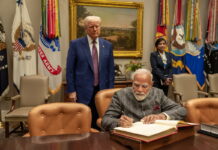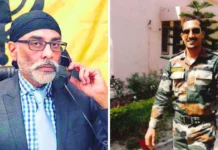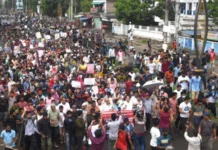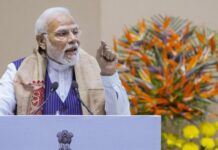The Society of American Asian Scientists in Cancer Research is a non-profit, non-political organization registered in the state of California in 2004 and has more than 5,000 members. All our members are also members of American Association for Cancer Research (AACR). SAASCR scientists are from Asia, mainly of Indian origin, working in the USA and Canada in the field of cancer research and fully sponsored by the biotechnology companies.
Dr. Rajvir Dahiya, the president of SAASCR, presented awards to these scientists on April 27th 2025 in Chicago, Illinois during American Association for Cancer Research Annual Meeting. Dr. Rajvir Dahiya is a Professor Emeritus at the University of California at San Francisco (UCSF) School of Medicine. Dr. Dharam Pal Chauhan is a secretary of SAASCR and is a retired Professor from University of California San Diego (UCSD) School of Medicine.
Dr. Sunil Krishnan serves as professor and director of radiation oncology at the McGovern Medical School, UTHealth Houston. He holds the John P. and Kathrine G. McGovern Distinguished Chair. Dr. Krishnan received his medical school training from Christian Medical College, Vellore, India in 1995, residency training in Internal Medicine from Penn State Geisinger Medical Center, Danville, PA and residency training in Radiation Oncology from Mayo Clinic, Rochester, MN.
Dr. Krishnan’s first faculty appointment was in the gastrointestinal radiation oncology section at MD Anderson Cancer Center in 2004 where he rose through the ranks to full professor in 2014. He held the John E. and Dorothy J. Harris Endowed Professorship in Gastrointestinal Cancer there and directed the Center for Radiation Oncology Research for the entire institution. He also co-directed the Radiation Oncology, Biology, Physics program of the MD Anderson Cancer Center Support Grant.
He also co-directed the cancer nanotechnology T32 training grant for graduate students and postdoctoral fellows at MD Anderson and Rice University. In 2019, Dr. Krishnan moved to the Mayo Clinic in Jacksonville, FL as professor of radiation oncology. While there, he was co-leader of the Gastrointestinal Cancers program of the three-site Mayo Clinic Cancer Support Grant, director of the Jacksonville Office of Clinical Trials, and held the Florida Department of Health Cancer Research Endowed Chair. Since returning to Houston, Dr. Krishnan has revived his affiliation with the MD Anderson Cancer Center UTHealth Houston Graduate School of Biomedical Sciences and serves as the co-director of the Therapeutics and Pharmacology graduate program.
Dr. Krishnan’s clinical research is focused on the development of novel treatment approaches for patients with hepatobiliary, pancreatic, and rectal tumors, defining the role of radiation therapy in the management of these cancers, identifying predictors of response to treatment, and incorporating novel treatment techniques in the clinic.
His laboratory research focuses on devising new strategies to sensitize tumors to radiation therapy and protect normal tissues from radiation injury using nanoparticles, chemotherapeutics, biologics, and botanicals. A major thrust of the laboratory has been the design, fabrication, characterization, validation, and mechanistic inquiries of nanoparticles for diagnosis and treatment of cancer. These include carbon-based, organic, inorganic, hybrid, and multilayered nanostructures.
Pivotal work has focused on the use of gold nanoparticles as radiation sensitizers via radiation dose enhancement and/or photothermal activation, and designer nanoparticles that improve pharmacokinetics and payload delivery characteristics via stimulus-responsiveness, bio-inspired molecular mimicry, Trojan-horse approaches, and phagocytosis evasion strategies.
The laboratory also anchors a Center for Physical Energy Therapeutics that evaluates new strategies of combining localized physical energy therapeutics (ionizing and non-ionizing radiation of all flavors, thermal therapies, ultrasound) with targeted therapeutics (custom nanoparticles, antibody-drug conjugates, targeted protein degraders, immune-therapeutics) in a one-two punch synthetical lethality approach. Dr. Krishnan’s laboratory research has been continuously funded by peer-reviewed extramural grants for over 15 years, the majority of these being from the National Institutes of Health.
Dr. Krishnan has authored and coauthored over 300 peer-reviewed manuscripts, co-edited three textbooks, co-authored 20 book chapters, been awarded five patents (with six pending), and served as editor of multiple scientific journals including as editor-in-chief of Cancer Nanotechnology.
His publications have been cited over 28,000 times; his h-index is above 95, and more than 95 of his papers have been cited over 100 times (I100 index of 95) highlighting the impact of his research work within the scientific community. He enjoys working with students at all stages of their academic career, leading an outstanding research team of clinicians and scientists, and collaborating with colleagues across departments and institutions. In particular, this manifests as interactions at the intersection of the physical and biological sciences, where there is much to be learned from otherwise non-intersecting disciplines.
Dr. Krishnan’s dedication to advancing cancer research and improving patient outcomes via novel therapeutics has been recognized with numerous awards and honors. He is an elected fellow of the American College of Physicians, the American Society for Radiation Oncology, and the American Institute for Medical and Biological Engineers, the Royal Society of Chemistry, the Institute of Physics, rounding out a trifecta of physics, chemistry, and biology recognitions. He has served as co-chair of the GI Translational Research Committee of the Radiation Therapy Oncology Group/NRG Oncology, chair of the gastrointestinal scientific program committee and education committee of the American Society for Radiation Oncology, and a consultant for liver cancers and advisor for rectal cancers at the International Atomic Energy Agency.
Dr. Chandan Guha, serves as Professor, Vice Chairman, and founding Director of the Einstein Institute for Onco-Physics at Montefiore Medical Center and Albert Einstein College of Medicine in New York. He also holds the prestigious Harry Eagle Chair in Cancer Research, National Women’s Division, and is a Professor of Pathology and Urology. Originally trained in medicine at the University of Calcutta and later earning his PhD in immunology from the Medical University of South Carolina, Dr. Guha was among the first scientists in the 1990s to explore how radiation therapy could stimulate the immune system — a concept that laid the groundwork for modern in situ tumor vaccines.
Over the past three decades, Dr. Guha’s groundbreaking research has produced major innovations, including the development of Radiation-enhanced Autologous in situ Tumor Vaccines and LOTUS (Low Intensity Therapeutic Ultrasound-activated Immune Response) against cancer therapy. His work spans critical contributions in pancreatic cancer therapy with Carbon Ion Radiation (funded by the NIH), radiation biodosimetry, and the development of regenerative cell therapies to repair radiation injuries. He is the inventor of multiple patents and a co-founder of BioConvergent Health, a biotechnology platform merging drug, device, and cell therapies to revolutionize cancer and regenerative medicine treatments.
In addition to his pioneering work in cancer immunotherapy, Dr. Guha has led major advances in mitigating radiation-induced injuries, particularly gastrointestinal, liver, and hematopoietic syndromes. His research team has developed and validated a range of innovative growth factor and cell-based therapies for radiation injury, supported through competitive funding from the National Institute of Allergy and Infectious Diseases (NIAID) Radiation Countermeasure Program. His contributions are critical for advancing emergency preparedness in radiation exposure scenarios and improving survivorship after radiological events.
Dr. Guha’s entrepreneurial spirit is matched by his scientific rigor — his translational research efforts have led to clinical trials across the U.S., India, and China, including at the Shanghai Proton and Heavy Ion Center where he served as the first Director of Translational Oncology.
Dr. Guha’s career stands as a testament to the power of visionary science, bold innovation, and a deep commitment to improving human health. His work continues to drive transformative change across oncology, regenerative medicine, and radiobiology — inspiring the next generation of scientific leaders.
Dr. Prasad Adusumilli is a Professor and Vice Chair of Translational Research in the Department of Surgery at Memorial Sloan Kettering Cancer Center, New York. Dr. Adusumilli serves as Deputy Chief of Thoracic Surgery and performs complex and minimally invasive cancer resections for lung cancer, mesothelioma, thymoma, and other cancers of the chest. He carries an international reputation for treating mesothelioma, an aggressive cancer of the lining of the lung resulting from asbestos exposure. Dr. Adusumilli is also an expert in robotic bronchoscopy, an advanced endoscopic outpatient procedure wherein multiple lung nodules and lymph nodes can be biopsied in patients by use of a computerized real-time image-guided robotic system.
Dr. Adusumilli research focuses on cancer immunology and the development and translation of immunotherapy. Supported by prestigious National Cancer Institute and Department of Defense awards, his laboratory has published papers that were among the first to highlight the prognostic importance of tumoral and stromal immune cell infiltration in thoracic cancers, which provided the foundation for investigating immune modulation. To date, his laboratory has analyzed tumors, peripheral blood, and body fluids from more than 12,000 patients to advance the understanding of cancer immunology and patient immune system responses to cancer cells. At present, his laboratory is analyzing tumors from patients after immunotherapy to understand secondary resistance to immunotherapy and to develop agents to overcome this resistance.
Using the knowledge generated from analyzing tumors from patients, Dr. Adusumilli’s laboratory established clinically relevant solid tumor models and investigated treatment with biological therapies, including oncolytic viruses and chimeric antigen receptor (CAR) T cells. CAR T cells are T cells harvested from the patient’s peripheral blood, genetically engineered to recognize and target cancer cells, and given back to the patient as treatment. Multiple clinical trials initiated by the Adusumilli laboratory have shown the safety and anticancer effects of CAR T cells, prolonging survival of patients with advanced cancer. The resulting mechanistic data have been translated to clinical trials, including trials of combination immunotherapy to reactivate both CAR T-cell and endogenous immunity by use of cell-intrinsic and -extrinsic checkpoint blockade strategies.
The Adusumilli laboratory has identified new antigen targets and costimulatory domains for CAR T-cell therapy. Dr. Adusumilli’s discoveries in lung adenocarcinoma pathobiology were included in the World Health Organization classification of lung tumors and resulted in changes in clinical practice. He has mentored more than 150 junior faculty, postdocs, and MDs, resulting in more than 320 publications—one-third in high-impact journals—and has been honored with more than 100 research awards. He is an elected member of the Fleischner Society, the American Society of Clinical Investigation, the American Surgical Association, and the American Association for Thoracic Surgery.
Resham Bhattacharya is a Professor in the Department of Obstetrics and Gynecology and a Co-Leader of the Cancer Biology Program at the NCI-designated Stephenson Cancer Center (SCC) at the University of Oklahoma. She is an elected fellow of the American Institute for Medical and Biological Engineering. Dr. Bhattacharya received her Ph. D. degree from the Bowling Green State University, Ohio in 2002. Dr. Bhattacharya received her post-doctoral training from Beth Israel Deaconess Medical Center, Harvard Medical School, and the Mayo Clinic in Rochester, MN.
Through the course of her academic career Dr. Bhattacharya has maintained an actively funded research program in gynecologic cancers and vascular biology. With an h-index of 58, Dr. Bhattacharya has published over 120 peer-reviewed articles having more than 29,000 citations. In addition to teaching and mentoring graduate students, post-doctoral fellows and clinical fellows, Dr. Bhattacharya continues to mentor faculty both within and outside the institution.
Dr. Bhattacharya pioneering research defined novel pathways regulated by the stem cell factor, BMI1 in ovarian cancer, followed by pre-clinical testing of the pathway by a novel nano-delivery system as well as by small molecule inhibitors ultimately leading to clinical trials at the University of Oklahoma Health Sciences Center (OUHSC). Her collaborative research studies reported several seminal observations on the nanomaterial-cellular interface pertaining to mechanisms of cellular uptake, drug delivery and molecular target discovery using nano-proteomics approach.
Furthermore, her mechanistic research identified the TGF beta pathway as a target in uterine carcinosarcoma (UCS), an aggressive malignancy with no prior molecular-targeted therapy. This provided the basis for a recently completed clinical trial of the TGF beta receptor1 kinase inhibitor in UCS at OUHSC. Her research in vascular biology have elucidated pathways that regulate vascular hemostasis especially with respect to the metabolic enzyme cystathionine beta synthase that produces hydrogen sulfide, recognized as a prominent gaso-transmitter. A critical discovery is that the hypoxia inducible factor alpha is regulated by hydrogen sulfide signaling in normoxic conditions, which has substantial implications for metabolism and inflammation.
Her leadership is recognized from the institutional committees on which she serves, i.e., a member of the faculty senate, member of the COBRE and INBRE advisory and mentoring committee, a member of the institutional animal care and use committee and has served as a member of the institutional review board. She has also served as a valuable member of the internationally recognized NRG Oncology group which helps establish the guidelines for treatment of patients with gynecologic malignancies worldwide. Because of her pioneering contributions, Dr. Bhattacharya has been awarded the President’s Associates Presidential Professor by the University of Oklahoma.
Dr. Bhattacharya regularly provides her expertise on international and national panels including NIH Study Sections and DOD Cancer panels. Dr. Bhattacharya is an Editorial Board member for several scientific research, and cancer-related journals, including one from the premier Nature group of publications. For several years she has been an organizing member of the International Ovarian Cancer Consortium, the Annual Cancer Research Symposium including the inaugural Co-Chair of the Web of Life Conference in 2024.
Dr. Natarajan Muthusamy is a professor of medicine, associate division director (Academic Affairs), Division of Hematology, Department of Internal Medicine at College of Medicine, The Ohio State University (OSU). He is also a member of the Leukemia and Hematological Malignancies Program and co-director of the Experimental Hematology Laboratory at the NCI-Designated OSU Comprehensive Cancer Center. Following his PhD degree in Immunology from the University of Kentucky in 1992, Dr. Muthusamy completed his Post-Doctoral training at the Howard Hughes Medical Institute and the University of Chicago in Molecular Immunology, focusing on transcriptional regulation of lymphocyte development by Ets and CREB/ATF family of transcription factors using engineered mouse models. In 1997, he joined the faculty at OSU.
Dr. Muthusamy’s research focuses on translational medicine with an emphasis on disease biology and biological and targeted therapies in hematological malignancies. For the past 35 years, he has developed extensive expertise in the generation and characterization of animal models to study hematopoietic development, malignancies, and therapy evaluation. His contributions to our understanding of transcriptional regulation of T cell development and function are highlighted in his publications in Nature. Over the past two decades, his research has focused on the evaluation of biological and targeted therapies in chronic lymphocytic leukemia (CLL), acute lymphocytic leukemia, acute myeloid leukemia, and mantle cell lymphoma.
The recent seminal discoveries of the existence of leukemia-initiating cells and their therapeutic vulnerabilities in CLL—and strategies to target leukemic cells while sparing normal healthy counterparts in the patients—has been the fulcrum of his ongoing research. He has published ~150 peer-reviewed manuscripts in high-impact journals such as Nature, Nature Communications, Cancer Cell, Cell Reports, Immunity, Blood, Leukemia, Journal of Clinical Investigation, Journal of Immunology, EMBO J, PNAS, and Science Translational Medicine, among other publications. He is also the co-inventor of several patents awarded around the discoveries of his team. In addition to serving as principal investigator in several current and past NIH R01 grants and leadership roles in programmatic grants, he currently serves on the National Institute of Health, American Cancer Society, Department of Defense, and American Society of Hematologists grant review committees.
Dr. Muthusamy has also been actively involved in building collaborative interactions and student exchange programs in India over the years through his involvement in the INDIA-GATEWAY program at OSU. He has been extensively involved in training more than 50 trainees, including junior faculty members, PhD and MD/PhD students, medical students, postdoctoral fellows, clinical fellows, undergraduate and high school students, and high school teachers. Several of his past trainees have been recipients of national and local fellowships and trainee and achievement awards, now holding academic positions in various capacities, including instructors, assistant professors, associate professors, and full professors. He has also hosted exchange students and faculty members from India and other countries in his laboratory.
Dr. Manmeet Ahluwalia is a professor of Translational Medicine at Florida International University’s Herbert Wertheim College of Medicine. He serves as the Chief of Medical Oncology, Chief Scientific Officer, and Deputy Director at Miami Cancer Institute (MCI) since 2021, where he holds the Fernandez Family Foundation Endowed Chair in Cancer Research. He also serves as a Medical Staff of Memorial Hospital for Cancer and Allied Diseases, Memorial Sloan Kettering Cancer Center (MSKCC) in New York. He received his medical degree from Maulana Azad Medical College, University of Delhi in 2000. He did his Internal Medicine residency at Cleveland Clinic Health System, Cleveland, OH followed by Hematology and Oncology Fellowships at Roswell Park Center Institute. He has a master’s degree in business administration (MBA), from the Weatherhead School of Business of the Case Western Reserve University.
Dr. Ahluwalia’s research is focused on the development of novel treatment approaches for patients with brain tumors and brain metastases and as a leader in Neuro-Oncology, he has spearheaded clinical research, and secured significant NIH grants, including two RO1 grants as Co-Principal Investigator, and serves as the clinical trial leader on PO1 grants with over 10 million in funding. He has published 275 peer reviewed publications, with over 19000 citations and a H-index of 67. He has an established track record of accomplishment in mentoring medical students, residents, and fellows during his career at Cleveland Clinic and now at MCI.
Dr. Ahluwalia has several leadership positions on national and international committees including the Chair of the Brain Tumor Working Group of SWOG and on the NCI steering committee for Brain Tumors. He also serves as the Co-Chair, Response Assessment in Neuro-Oncology (RANO) Working Group on Brain metastases, Co-Chair Precision Oncology Alliance International Group, Caris Lifesciences, Co-Chair, Response RANO RECIST Working Group on Brain metastases and the Executive Leadership Council of Precision Oncology Alliance, Caris Lifesciences. He serves on the Business of Oncology Editorial Board of American Society of Clinical Oncology (ASCO).
Dr. Ahluwalia has been the recipient of multiple awards including Crain’s 40 under 40, Northeast Ohio, ASCO Leadership Development Program Award, Leading in Healthcare, Cleveland Clinic, Career Development Award of National Cancer Institute, Most Distinguished Physician Award, American Association of Physicians of Indian Origin, Fellow of the ASCO and the inaugural Oncology Icon Award, Targeted Oncology, American Society of Clinical Investigation (ASCI) and Ellis Island Medal of Honor underscoring his significant contributions to the field.
Dr. Golam Mohi is a professor in the department of Biochemistry and Molecular Genetics at the University of Virginia School of Medicine. He received his Ph.D. in Molecular Cell Biology from the University of Tokyo, Japan. He did his postdoctoral training at Beth Israel Deaconess Medical Center/Harvard Medical School. Dr. Mohi became an independent faculty in 2006. His research is focused on identifying the molecular and epigenetic mechanisms of blood cancer. Dr. Mohi has made significant contribution in understanding the molecular pathogenesis of myeloproliferative neoplasms (MPNs) and identification of novel therapeutic targets. His work is instrumental in the design of an ongoing multicenter Phase 1/2 clinical trial of PIM1 inhibitor TP-3654 in patients with myelofibrosis. Dr. Mohi is a recipient of the American Society of Hematology (ASH) Scholar Award and the Leukemia & Lymphoma Society (LLS) Scholar Award. His research is continuously funded by the NIH for last 16 years. He has published his research findings in high impact journals like, Cancer Cell, Nature Medicine, Nature Communications, PNAS, Blood and Cancer Research. Dr. Mohi has served in various NIH study sections. He is also a Scientific Committee Member of the American Society of Hematology.
Dr. Suresh S. Ramalingam is the Executive Director of the Winship Cancer Institute of Emory University. He serves as Professor of Hematology and Medical Oncology and the Roberto C. Goizueta Chair for Cancer Research at the Emory University School of Medicine. He received his MBBS from the University of Madras in 1992 and residency in Internal Medicine from the Wayne State University School of Medicine, Detroit, Michigan. Dr. Ramalingam did his fellowship in Hematology Oncology from the University of Pittsburgh School of Medicine, Pittsburgh, Pennsylvania in 2002.
Dr. Ramalingam’s research is focused on the development of novel treatment approaches for patients with lung cancer. Specifically, his group has developed novel treatment options for lung cancer patients harboring an EGFR mutation, resulting in FDA approvals of third generation inhibitors for metastatic and locally advanced NSCLC. Dr. Ramalingam’s research has also delved into the molecular mechanisms underlying lung cancer progression and resistance to therapy. His work on the defining the resistance mechanisms to 3rd generation EGFR inhibitors has provided critical insights that have informed the development of combination therapies to overcome this resistance. This research has been instrumental in identifying new therapeutic targets and improving the efficacy of existing treatments. Dr. Ramalingam has also played in major role in understanding mechanisms that drive sensitivity to immune checkpoint inhibitors in lung cancer. He has published more than 400 peer reviewed publications, with over 36,000 citations and a H-index of 80. His research has been published in leading journals including the NEJM, Lancet, Science, Nature, PNAS, JCI and JCO. He serves as the principal investigator for the Emory University Lung Cancer SPORE award from the NCI.
Dr. Ramalingam has served on numerous committees and advisory boards, including the National Cancer Institute’s Thoracic Malignancy Steering Committee. Dr. Ramalingam’s dedication to advancing cancer research and improving patient outcomes has been recognized with numerous awards and honors. He is a recipient of the Paul Bunn Award for Scientific Achievements by the IASLC, and the NCI Clinical Investigator Team Leadership Award, among others. He has maintained a high level of peer-reviewed funding throughout his career. He presently serves as the Principal Investigator of the Emory Lung Cancer SPORE Award; he is also co-PI of a P01 award focused on overcoming resistance to immunotherapy in LKB1 mutated lung adenocarcinoma.
Dr. Ramalingam serves as the Editor-in-chief for ‘Cancer’, an official journal of the American Cancer Society. He is past president of the Georgia Society of Oncology and a former member of the Emory Healthcare board of directors. He is a member of the NCI ‘Clinical Trials and Translational Research Advisory Committee’. He presently serves on the boards of the American Association of Cancer Institutes and the Georgia Center for Oncology Research and Education.
Dr. Ramasamy Paulmurugan is a Professor in the Department of Radiology at Stanford University and a member of the Canary Center for cancer early detection, the Molecular Imaging Program at Stanford (MIPS), Stanford Cancer Institute (SCI), Wu Tsai Neuroscience Institute, and the Stanford Bio-X program. Paulmurugan received his Master’s Degree in Biomedical Genetics (1991) and PhD in Molecular Virology (1997) from the University of Madras, India. After serving as a scientist for four years in Rajiv Gandhi Center for Biotechnology, Trivandrum, India, he joined the School of Medicine at University of California, Los Angeles (UCLA) as a visiting scientist in 2001. In 2003, he moved to Stanford as a Senior Research Scientist. Since 2009, he has been a faculty member in the Department of Radiology at Stanford University under the Molecular Imaging Program (MIPS) and Canary Center for Cancer Early Detection. Paulmurugan has more than 25 years of experience in the use of in vivo imaging modalities such as bioluminescence, fluorescence, PET, SPECT, US, MRI, and CT, for monitoring different cellular events in small (mice and rats) and large animal models (pig and dog). He published over 250 journal articles, 9 filed patents, 27 book chapters, and one book to his credit (H-Index: 60). In addition to his research, he contributes to the academic landscape by teaching (immunooncology), reviewing grants for esteemed organizations such as the NIH, and DoD, and by evaluating manuscripts for publication in journals and conference proceedings. His expertise spans nearly two decades, focusing on imaging modalities, particularly in the realms of molecular imaging and cancer biology. He received several awards from various scientific organizations for his contributions to the scientific communities. He was selected as a Distinguished Investigator in 2018 by The Academy for Radiology & Biomedical Imaging Research, RSNA.
Dr. Paulmurugan is a pioneer in developing split-reporter protein complementation systems for different reporter genes (luciferases, fluorescent proteins, and thymidine kinase), and has been using them for imaging cellular protein-protein interactions, protein folding and protein degradation in living animals. Currently, his lab (Cellular Pathway Imaging Laboratory (CPIL)) is working on the application of different imaging strategies to evaluate the therapeutic role of ERb, another important estrogen receptor, as one of the important players in estrogen biology. Other applications where his lab currently applying these assays include studying protein-protein interactions involved in estrogen receptor signaling, Nrf2-mediated antioxidant signaling in chemoresistance, p53-sumoylation mediated chemotherapy responses in cancer, NFkB mediated cytokine signaling in cancer, and APP and Tau proteins sumoylations in Alzheimer’s disease.
In addition to his focus in basic science, he also works in cancer therapy, where he is exploring microRNA-based reprogramming approaches to sensitizing drug-resistant cancers (breast cancer, hepatocellular carcinoma, and glioma) to commonly used chemotherapies. His lab mainly targets oncogenic and tumor suppressor microRNAs (miR-21, miR-10b, miR-122, and miR-100) to improve cancer therapy. To deliver intact miRNAs in vivo, his lab uses ultrasound-microbubble (US-MB) mediated sonoporation to improve locoregional enhancement of microRNAs’ delivery to cancer tissues. In synthetic biology, he recently invented the application of high-pressure microfluidic system in the reconstruction of biomolecules derived from cells (proteins and lipids) along with synthetic sources (phospholipids, polymers, and surfactants) to develop self-assembled nano- and micro-structures that mimic biological membranes for drug delivery applications. As part of this process, he developed biomimetic microbubbles (biMBs) and nanobubbles (biNBs) using tumor cell derived exosomes (TDEs) for cancer immunotherapy applications. He also developed an efficient way to reconstruct microvesicles (MVs) derived from different cell sources into EVs of uniform sizes using a microfluidic system and to load miRNAs and drugs. His lab leverages their experiences in ultrasound molecular imaging and cancer immunotherapy to develop novel targeted MBs engineered with immune antigens specific for human liver cancer (MUC1 and GPC3) and immunomodulatory microRNAs (miR-122 and antimiR-21) to improve treatment outcome and survival rate in patients with advanced unresectable HCC.
- Sunil Krishnan, MD, FACP, FASTRO
- Professor and Director of Radiation Oncology
- John P. and Kathrine G. McGovern Distinguished Chair
- Vivian L. Smith Department of Neurosurgery
- McGovern Medical School
- UT MD Anderson Cancer Center, Houston, TX 77054
- Email: sunil.krishnan@uth.tmc.edu
- Chandan Guha, MBBS, PhD.
- Professor and Vice-Chair, Radiation Oncology
- Professor, Urology and Pathology
- Director, Einstein Institute for Onco-Physics
- Albert Einstein College of Medicine
- Bronx, NY 10461
- Email: cguha@montefiore.org
- Prasad S Adusumilli, M.D.
- Professor, Cardiothoracic Surgery
- Memorial Sloan Kettering Cancer Center
- Weill Cornell Medical College, Cornell University
- New York, NY 10065
- Email adusumip@mskcc.org
- Resham Bhattacharya, Ph.D.
- Professor, Department of Obstetrics & Gynecology
- Section of Gynecologic Oncology
- President’s Associates, Presidential Professorship
- Co-Chair of Cancer Biology Program, Stephenson Cancer Center.
- Oklahoma City, OK 73104
- Email: resham-bhattacharya@ouhsc.edu
- Natarajan Muthusamy, DVM, Ph.D.
- Associate Director of Academic Affairs, Division of Hematology
- Professor, Internal Medicine
- The Ohio State University Comprehensive Cancer Center
- Professor (Adj) Dept of Vet. BioSciences
- The Ohio State University
- Columbus, OH 43210
- Email: raj.muthusamy@osumc.edu;
- Manmeet Singh Ahluwalia, M.D., MBA, FASCO
- Professor of Translational Medicine
- Miami Cancer Institute, Baptist Health South Florida
- Herbert Wertheim College of Medicine Florida International University,
- Miami, FL 33199
- Email: manmeeta@baptisthealth.net;
- Golam Mohi, Ph.D.
- Professor
Department of Biochemistry and Molecular Genetics - University of Virginia School of Medicine,
- Charlottesville, VA 22908
- Email: gm7sj@virginia.edu
- Suresh S. Ramalingam, M.D., FASCO.
- Executive Director
- Winship Cancer Institute of Emory University
- Roberto C. Goizueta Chair for Cancer Research
- Emory University School of Medicine, Atlanta, GA 30322
- Email: ssramal@emory.edu
- Ramasamy Paulmurugan, Ph.D.
- Professor of Radiology
- Director, Cellular Pathway Imaging Laboratory.
- Stanford Cancer Institute
- Stanford University School of Medicine.
- Palo Alto, CA 94304
- Email: paulmur8@stanford.edu







